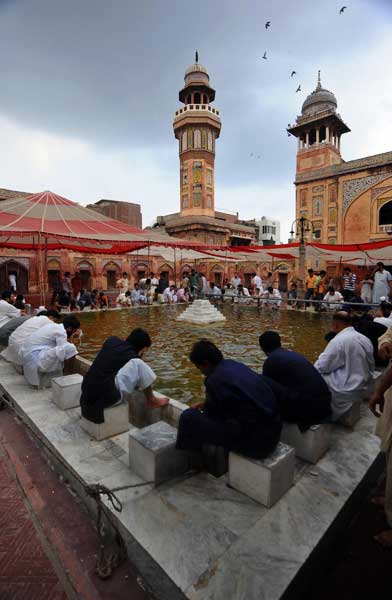Granta 112: Pakistan, Edited by John Freeman

Your support helps us to tell the story
From reproductive rights to climate change to Big Tech, The Independent is on the ground when the story is developing. Whether it's investigating the financials of Elon Musk's pro-Trump PAC or producing our latest documentary, 'The A Word', which shines a light on the American women fighting for reproductive rights, we know how important it is to parse out the facts from the messaging.
At such a critical moment in US history, we need reporters on the ground. Your donation allows us to keep sending journalists to speak to both sides of the story.
The Independent is trusted by Americans across the entire political spectrum. And unlike many other quality news outlets, we choose not to lock Americans out of our reporting and analysis with paywalls. We believe quality journalism should be available to everyone, paid for by those who can afford it.
Your support makes all the difference.When Granta magazine brought out a special India edition to mark the nation's "Golden Jubilee" year in 1997, the collection appeared to have a genuine sense of celebration, of a nation fighting to free itself from the ghost of colonial rule.
More than a decade later, Granta has turned its attention to India's beleaguered, bullet-riddled neighbour, Pakistan. What emerges is a land clouded in darkness, perhaps unsurprisingly, given that Pakistan is, 63-years after its birth, bent double with political strife, religious fundamentalism and rising militarism, when even its otherwise adored cricket team is mired in shame.
John Freeman, editor of the magazine, followed serendipitous, word-of-mouth leads and suggestions from the likes of the author, Patrick French to The Wire writer, Richard Price, to commission the 18 featured pieces. He gave the writers an open, unboundaried brief. What he received was some exquisitely-crafted pieces aboutdoomed love, teen romance, immigrant nostalgia. More often than not, however, the writing is framed within the unforgiving narratives of political repression, internecine savagery, and terror that overwhelm this collection.
The various works are a mix of memoir, poems, short stories, and reportage, from the likes of Fatima Bhutto, a scion of the Bhutto dynasty, to the eminent Urdu writer, Intizar Hussain. The "new" writers are, by and large, already leading lights who have established themselves in the firmament of international contemporary fiction such as Nadeem Aslam, Kamila Shamsie and Mohsin Hamid. While they may not be all that new, they offer fine, inventive fiction nonetheless.
Aslam's novella, "Leila in the Wilderness", one of the longest pieces in Granta's commissioning history which took the award-winning writer 15-years of rumination and rough drafts, is among the strongest offerings. Aslam manipulates the old subcontinental legend of star-crossed lovers, Leila and Qes, to dramatise the age-old prejudices towards the birth of girl babies that survive to this day in Pakistan. The result is spectacular, reminiscient of Angela Carter's feminist fairytales in The Bloody Chamber in its imaginative revisionism. He even employs magic realism to marry ancient legend with the post 9/11 politics of the here and now.
If Granta's India edition brought to light the brilliant young writer, Arundhati Roy, who won the Booker prize later that year, this collection's equivalent gem of a find is the older but nonetheless astonishing talent of the hitherto unpublished 79-year-old civil servant, Jamal Ahmad, whose collection of short stories has now been bought by Hamish Hamilton.
"The Sins of the Mother" is a stunning story of illicit love caught in the doomladen matrix of tribal honour and retribution. Any didacticism in the message behind the story - that honour killings are no less horrifying for being accepted custom in rural Pakistan - is cancelled out by the magnificence of Ahmad's storytelling.
Portraits are drawn of the key despots, military dictators and patriots: Zia-ul-Huq is depicted through his hypocritical, cowering acolytes; Basharat Peer offers a stark picture of wartorn Kashmir with its boy soldiers who use as their role models the fearless stone throwers and martyrs of Palestine ("Palestinian stone-throwers became their inspiration. The nucleus of the intifada is the vast square and maze of lanes around Srinagar's grand mosque..." ). The Gemini-nature of the country's founding father, Mohammed Ali Jinnah, is shown in the way in which his image is packaged and repackaged by subsequent leaders, from those portraits that capture him as a dandified, Western-educated secularist to high-collared photographs that suggest he is a devout friend of the clerics.
Declan Walsh's reportage on Pashtun machismo in the North West Frontier, delivered so poetically, and Lorraine Adams and Ayesha Nasir investigations into the prosecution cases behind the 'war on terror' are as dazzling and dramatic as fiction.
Granta's Pakistan is a bleak but mersmerising one that rages with astounding horrors. Yet this "immense homeland of heartbreaking beauty" is not without love, romance, nor hope.
Join our commenting forum
Join thought-provoking conversations, follow other Independent readers and see their replies
Comments